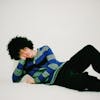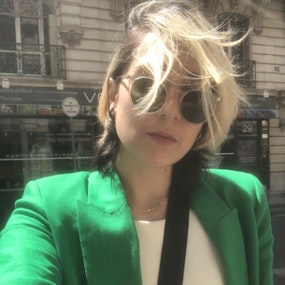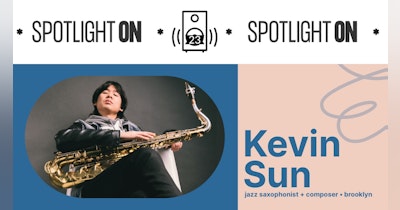When we fall out of love, where do we go?
Italian indie/alt-rock artist Alessandro Cabrini's newest single "E Mi Lasci Bruciare" translating to "And Let Me Burn," contemplates some truths to that question. The Copenhagen-based singer/songwriter is not scared to graze the vulnerably confessional in our interview, in contrast to his more roaring aggressive sounds on his newest track. Yet when Cabrini first called up his producer friend to scream away that post-breakup emotions in his home studio, he had no idea the track would mark his shift from softboi indie/pop to grunge-rock, let alone become his first “Italian song”.
Miriam Boulos: How did your newest single “E Mi Lasci Bruciare” come together? What was the process behind the scenes like?
Alessandro Cabrini: “E Mi Lasci Bruciare” is one of five tracks of an upcoming EP that I recorded with producer/artist RUVENRUVEN. With this EP, I wanted to go in a more alternative rock, post-punk, experimental direction. It’s just the sound that I felt matched more what I wanted to say at the time, moving away from indie pop tracks I’ve been making in the past.
I had a first session with Matt Carson last March, almost a year ago. I had just gone through a breakup 10 days prior. I had so many lyrics and emotions. I had just lived a very intense week, which was the last week that I spent with my ex-girlfriend. And I was like “ugh there is so much here”. At the time I didn’t know how to play guitar and I had no real way of putting it out there, so I was like “Alright, Matt, please let’s have a session. Let me scream into your microphone for a while”. So, we started messing around in his home studio and we started off with “No Surprises” by Radiohead as a kind of inspiration. I love that track to death and it’s so perfect to me. I wanted to make an Alessandro Cabrini version of this song and what it would sound in my experience and with my own sounds and my own voice and everything. So that was the starting point which I think you can hear in the little arpeggiated guitar in the first part. After that we were like, “Okay, let’s fuck it up and get really loud with it and messy”.
MB: Can you tell us more about the Italian nature and bits of the song?
AC: The Italian nature of the song was completely improvised. I didn’t sit down being like “Oh this song is gonna be my Italian debut”, I was like “This is gonna be another English song”.
Then we didn’t know how to finish this hook. I was like “I need something short, repeatable, something that people can get their heart into”. Matt just had the track playing on loop and I was recording on my phone to make sure we didn’t miss anything. As he played it I started screaming these lyrics in Italian and he was like: “MY ASHI- what?”I explained to him what it meant and he fell in love with it immediately which was further confirmation for me that, okay, this was where this track was heading and that’s how the second Italian verse felt.. pretty natural. I took the track to RUVENRUVEN after that and kept building upon it, we didn’t’ have the second verse, we didn’t have a lot of instrumentation and that’s when things started to become what the track is now.
MB: Tell us why and how did you chose to draw focus on Italian for your title?
AC: Before we wrote the Italian part, the initial title of the song was going to be “Propane”. We liked it, we thought it was a good title in the beginning but then once we went ahead, we were like “E Mi Lasci Bruciare” there’s no other option.
I know that if you put it into marketing, strategy terms, it’s probably not the best idea because I have a predominantly English audience, even the people who worked on this song don’t know how to pronounce it. This song was so not about the audience at all for me. It was not about trying to have a song that people are gonna play on repeat. The chorus doesn’t hit until 1 minute and 40 seconds in. I knew that it wasn’t gonna be a radio on replay kind of song. Once I knew that, I was like “Let’s double down then and make it exactly how I want it to be, my first Italian song” and so I gave it the Italian name.
MB: Carelessly un-radio friendly, taking on that full on alternative rock path with this one, we hear a way more powerful, growl-ful Alessandro with a strong culmination that resolves in an abrupt dramatic ending, this is new for Alessandro musically. But for you, from your perspective, how does it differ from your previous body of work’? Is it a conscious evolution or a spontaneous exploration?
AC: Compared to Blue Ruin, it’s completely different, I was in a different headspace, a different person entirely. With Blue Ruin I had started experimenting a little with the sounds I’m integrating more now. In “1-800 (Intro)” to (the song) “Blue Ruin”, it’s like a rock kind of intro with all these roaring guitars and all the bad stuff but I feel like at the time I wasn’t ready to go all in, in that direction. Also, so much of how you express yourself sonically comes down to how much you know yourself. I feel like now, I’m comfortable enough in knowing that the sounds I create match who I am. At the time I wanted to be an indie softboi, that kinda thing. I guess there was always a part of me that wanted to lean into the more aggressive sounds. So, the switch was really meeting RUVENRUVEN and having a producer that could really translate my ideas into what I wanted and understand my thoughts and turn them into music.
In general, I also started expanding my musical tastes. I started listening to a lot more alternative music and I started delving into a lot of more post-punk genres. Listening and hearing how much diversity there is in those genres and how those labels are so meaningless in a way because there’s so much alternative rock and post punk that sounds completely different from each other but are categorized that way. These kinds of labels are all encompassing and my music kinda falls somewhere in that spectrum so that’s the direction I wanna head and that’s what feels best for me. That evolution came from that, from a lot of experience, new connections and a better understanding of who I am as a person, who Alessandro is, I guess.
MB: I've noticed the public playlist you've curated includes artists you’ve just mentioned like Radiohead, Deftones, and Jeff Buckley. Are these iconic musicians a significant source of inspiration for your work? And are there other artists who have influenced your musical style?
AC: Yeah, everyone in that playlist is a huge inspiration for me as artists and musicians and as people. Their discographies have had a huge impact on me and how my music sounds. I try to keep it to songs that inspired “E Mi Lasci Bruciare” but on a grander scale there’s more voices that have influenced my style. If I didn’t say Phoebe Bridgers, I’d be a fool. I’ve been listening to Phoebe for so long. Her and James Blake are the people with the songwriting royalty. I want my lyrics to be as fifth as impactful as their lyrics. So, they’re a huge influence.
But the ones on my playlist are more of a sonic influence and I think people will hear that on the EP as well.
MB: Speaking of lyrics, my favorite from your new track is “I was your home, till I went up in flames”, do you have any particular ones that resonate most with you?
AC: Definitely “I was your home, till I went up in flames”. I wouldn’t say it was the foundation because the first line “Tomorrow it all changes” were the first lyrics I wrote for that song, but the rest of the song really sits on top of the chorus, to me that metaphor of being the house on fire became the main theme of the track. Fire was a recurring thing in the lyrics to this song partially because it was written a handful of days after Fallas in Valencia[i].
The line “your eyes on fire” is one of my favorite lines as well. It’s obviously about the girl I was seeing at the time, who was there during Fallas so there’s this double entendre of “eyes on fire” because we spent a week crying together and then eyes on fire because I have this vivid image of seeing the reflection of the flames of Valencia on fire in her eyes literally.
This idea of being a home that can’t fulfill its duty anymore is kind of my way of explaining the feeling of falling out of love with someone and having to kick them out in a way because if they were to stay there, I guess you would both sort of crash and burn. But I think my favorite is “I’m losing weight, and I don’t know what day it is, if I miss one more meal I might become invisible”. That was a very real reflection of how I was feeling at the time, I was in such a bad state having maybe one meal a day. But also, it’s a call-back to an Italian saying that goes like “Se non mangi diventerà invisible”, that kind of exaggeration and culture of “fucking eat”, whatever size you are you are always too skinny.
It was an extra nod to my Italian side without it being in Italian particularly, so I think that is my favorite lyric probably.
MB: This new single marks the beginning for your upcoming EP, can you provide any insight what your future music endeavors might entail?
AC: I have a second single from this EP coming out soon. I want people to sit a little bit with this one. There’s more music coming soon and since I’ve been in Copenhagen, I’ve been writing a lot and making demos and planning to turn them into new projects down the line and joining forces with RUVENRUVEN again. There’s definitely more to come so I’m really excited.
[i] Fallas is a traditional, annual Spanish festival in the Valencian community known for burning large cardboard and wooden sculptures in the streets
###
FAQs About This Article
wherein an AI reads the article and suggests a few questions that remain unanswered...
Q: The concept of a home burning down is used as a metaphor for falling out of love in the song, “E Mi Lasci Bruciare”. How can the process of ending a relationship be compared to the destruction and loss associated with a house fire, and what insights can this analogy offer about the emotional impact of heartbreak?
A: The metaphor of a burning home to represent the end of a relationship is a powerful one, as it captures the sense of profound loss, destruction, and emotional upheaval that often accompanies a painful breakup. Just as a house fire can consume cherished possessions and leave behind only ashes and charred remains, the end of a relationship can feel like a complete devastation of one's emotional world. The memories, hopes, and dreams that were built within the partnership are suddenly destroyed, leaving a void that can be difficult to navigate.
The process of rebuilding after a house fire can be long, arduous, and emotionally taxing, much like the journey of healing from a broken heart. It requires sifting through the rubble of what was lost, salvaging what can be saved, and gradually reconstructing a new life from the ground up. This analogy highlights the resilience and strength required to overcome the pain of a failed relationship and eventually move forward.
Q: Cabrini mentions that his lyrics are influenced by the songwriting of artists like Phoebe Bridgers and James Blake. In what ways can the vulnerability and emotional depth of an artist's lyrics resonate with listeners who may be going through similar experiences, and how can music serve as a form of catharsis or healing during difficult times?
A: The emotional authenticity and vulnerability expressed in an artist's lyrics can create a profound sense of connection and resonance with listeners who may be experiencing similar struggles. When an artist openly shares their own pain, fears, and triumphs through their music, it can help to validate and normalize the complex emotions that listeners may be grappling with in their own lives. This recognition that one is not alone in their suffering can be incredibly comforting and empowering.
The act of listening to music that speaks to one's own experiences can serve as a form of emotional catharsis. By engaging with lyrics that articulate feelings that may be difficult to express, listeners can find a safe outlet for processing their own emotions. The music becomes a companion in times of distress, offering solace, understanding, and even a roadmap for healing. Through this shared experience, the artist and listener forge a unique bond, underlining the transformative power of music to unite and uplift individuals during life's most challenging moments.
Q: The interview touches on the idea that musical genres and labels can be limiting or meaningless, as artists within the same genre can produce vastly different sounds. How do genre classifications impact the way listeners discover and engage with new music, and what role does experimentation and boundary-pushing play in an artist's creative growth and development?
A: Genre classifications can serve as a useful tool for listeners to navigate the vast landscape of music and discover artists that align with their tastes. However, these labels can also be restrictive and fail to capture the nuances and diversity within a particular genre. When artists are pigeonholed into a specific category, it can limit the audience's perception of their creative range and potential.
Experimentation and boundary-pushing are essential for an artist's growth and development, as they allow for the exploration of new sonic territories and the expansion of their artistic identity. By defying genre conventions and blending elements from different styles, artists can create innovative and fresh sounds that challenge listeners' expectations and keep the musical landscape vibrant and evolving.
When artists refuse to be confined by genre labels, they open themselves up to a wider audience and create opportunities for listeners to discover music they may not have otherwise encountered. This cross-pollination of genres can lead to exciting collaborations, as well as a more diverse and inclusive musical community. Ultimately, while genre classifications can be helpful to a degree, it is the artists who are willing to push beyond these boundaries that often create the most compelling and enduring work.






